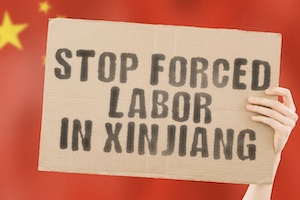Challenges Ahead! - Requesting to be Excluded From the Xinjiang Exclusions
By Bruce Leeds, Senior Counsel, Braumiller Law Group
In April of this year U.S. Customs & Border Protection (CBP) issued Headquarters Ruling H330077. The ruling was in response to a protest filed by an importer that had a shipment of wearing apparel excluded from entry under a Withhold Release Order (WRO) at the port of Newark, NJ. The wearing apparel was processed from cotton produced in India, made into yarn and fabric in China, and converted to wearing apparel in Cambodia. None of the parties to the transaction were located in the Xinjiang Region of China.
The documents accompanying the subject shipment (commercial invoice, packing list, certificates of origin, and bill of lading) listed the seller and manufacturer of the wearing apparel as the company in Cambodia. CBP suspected that the wearing apparel was made in whole or part with inputs from the Xinjiang Region and detained the shipment under the WRO.
Background
On January 13, 2021, the Executive Assistant Commissioner of the CBP Office of Trade issued a WRO to withhold the release of all cotton and tomatoes and their downstream products produced in whole or part in the Xinjiang Region of China. This WRO was based on information that reasonably indicated there was forced labor present in the supply chains of cotton and tomato products from the Xinjiang Region.
Under 19 USC 1307 provides that all merchandise produced in whole or part by forced, convict or indentured labor is denied entry into the US. The implementing regulations under 19 CFR 12.42-12.45 provide that if CBP finds at any time that information available reasonably but not conclusively indicates that imported merchandise is within the purview of Section 1307 release of any imported shipments shall be withheld unless the importer can establish by satisfactory evidence that the merchandise was not mined, produced, or manufactured in part with forced, indentured or convict labor.
OK – that is a long sentence but what it means is that if CBP reasonably believes imported merchandise was made with forced labor it can deny release of the shipment.
The Uyghur Forced Labor Prevention Act (UFLPA) superseded WROS on various products and replaced WROs with the application of a rebuttable presumption as of June 21, 2022. The UFLPA requires CBP to presume that goods manufactured wholly or in part in the Xinjiang or made by entities on the the UFPLA Entity List violate 19 U.S.C. § 1307. The burden of proof will be on the importer to prove its goods did not contain any such inputs.
Outcome in This Case
The importer in this case produced certificates of origin, sales contracts, commercial invoices, proof of payment, supply certificates, transaction certificates, maps and graphs showing production of cotton in India, processing it into yarn and fabric in China and processing the fabric into clothing in Cambodia. This evidence showed that no step of the production took place in the Xinjiang Region.
However, internal CBP documents indicated that one of the companies in this supply chain was linked with the Xinjiang Region. CBP then held that the importer did not produce sufficient evidence to establish that the wearing apparel was not produced wholly or in part with forced labor or that the supply chain was not linked with the Xinjiang Region. Accordingly, the protest was denied that the wearing apparel was excluded from entry.
Some Takeaways
- CBP may have information that you don’t. It may come from investigations or informers but could ruin your case.
- Not only merchandise produced in China may be subject to an exclusion. Any input from a party located in the Xinjiang Region may be sufficient to cause a shipment to be excluded from entry. What if an Italian company were to make spaghetti sauce using tomatoes from Xinjiang Region? That sauce would be subject to the UFLPA and excluded from the US.
- There is no such thing as too much evidence to show there were no Xinjiang entities in the supply chain. Your documents may be extensive – but are they extensive enough?
- Check the UFLPA Entity List at https://www.dhs.gov/uflpa-entity-list. If any of the companies on this list are directly or indirectly involved in an import transaction the shipment will likely be prohibited.
- Contracts and purchase orders with suppliers making goods having tomato or cotton inputs need to specify that (1) no part of the imported products originate in Xinjiang Region; (2) on request the suppliers will provide detailed evidence that no forced labor or Xinjiang inputs are involved with the products; and (3) the suppliers agree to reimburse the importer for any goods denied entry for UFLPA violations.



























